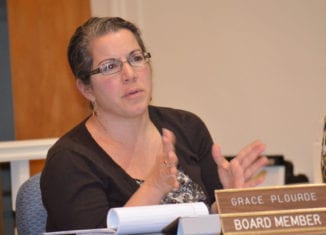State policies thwart schools from thriving
By Grace Plourde
Recently, the Smithtown Board of Education made a difficult decision. Following months of information-gathering and deliberation, we voted to close one of our elementary schools. During that long period of examination and deliberation, I had accepted as true — as accurate —many of the arguments put forth by the community for keeping Branch Brook open. It is an amazing school. I am not happy about an empty building in the Nesconset community where I was born and where I now raise my own children. And we did have some temporary relief this year, budget-wise, despite what’s projected to be a tax cap of less than 1 percent.
And yet, the decision to downsize was clearly necessary, because of factors which exist both inside and outside our Smithtown community. We must all agree that enrollment has been dropping. This year, once again, we’ll admit a kindergarten class that has about 35 to 40 percent fewer students than our graduating senior class. We anticipate this trend will continue, and so it’s necessary to take advantage of economies of scale where we can, in order to save the funds necessary to preserve our entire educational program going forward.
We also explained, more than once, the fact that school budgeting is no longer the collaborative effort of district staff and school communities; one carefully crafting a program worthy of our kids and the goals we set for them and the other acknowledging the worthiness of such a program with their “yes” votes on the third Tuesday in May.
Now, the process is more like a shoehorn, as districts create, not the program they want, or that their kids deserve, but the one they can “fit” within the narrow confines of an arbitrary metric. I’m talking of course about the tax cap, which, in New York’s case, is simply a bad rip-off of the Massachusetts model. It has none of the safeguards, no infusion of state aid, and no regard for program. It’s a political device, rather transparently aimed at busting unions. Except, schoolkids have no dog in that fight, and it’s beyond shortsighted of Albany to risk their educational destinies in this way.
Our legislature didn’t stop there, either. They gave, or rather took, the Gap Elimination Adjustment as a means to close a statewide budget gap. Instead of raising taxes, for which they might have been answerable to their constituencies, they simply “shorted” state aid to schoolkids. In Smithtown’s case, that meant $30 million of aid we should have gotten, but didn’t, over the course of a half decade or so. And, in a spectacular piece of euphemistic rebranding, the legislature has termed the recent cancellation of GEA-authorized fleecing as a “restoration.” That makes it sound as though they gave us some amazing gift when, in reality, all they did was finally put an end to the shell game.
When you consider that near 80 percent of Smithtown’s annual budget is taken up with professional salaries, and when you understand that those contractual salaries increase at about 2 to 3 percent a year, you can see that a tax cap of less than 1 percent puts us into an immediate deficit situation, unless we can make up the deficit through cuts. And this happens every year now, as the district and the board struggle to keep programs intact and plan for a sustainable future.
To make matters still worse, the state has provided financial incentives to homeowners to vote against any effort to pierce the cap. Do you want your STAR rebate next year? That’s easily done: just make sure that your school district complies with the cap. Never mind that educational programs will be slashed, schools will be closed, and your property values will be put at risk. If you choose to support your school district, and its efforts to maintain a quality program, it will cost you — big time!
So, given the budgetary landscape in which we presently find ourselves, we, the board of trustees, must do what is hardest. I want to you know that it is quite often a demoralizing, spirit-crushing endeavor. But we do it, because 9,450 kids depend on us doing it. It’s no longer the case that budgeting is done as a discrete, annual affair.
We look back, forward and sideways with every decision we make, and we are constantly taking stock. The goal around here has become “sustainability.” It’s a fight for survival. But we will not allow Smithtown to be the first district to fall over that fiscal cliff. And just because we got lucky in a couple of directions this year, does not mean that such luck is guaranteed to us. In fact, we know there are difficult days ahead.
Go ahead, right now, and bet everything you own on the stock market: your house, your anticipated annual income, everything you own. If that sounds ridiculous, recall that school budgeting means having a tax cap that is linked to CPI and bears no particular relation to the needs of the district’s students) and that our contributions to the employee and teacher retirement systems are similarly dictated by the whim of the market. A couple of years after the 2008 crash, we were absolutely devastated by the increase in that number.
Even if things were to stay “stable,” that only means we should expect increases of about 1 percent annually. However, due to factors such as the final payment of some debt service, we expect things to get far, far worse. Stay tuned, because “negative” tax levies have become more than theoretical, as some 80 districts statewide find themselves entitled to a smaller tax levy next year. This is Smithtown’s future.
And then consider that if you were held to the same constraints as your local school district, the state would only allow you to keep in “reserve,” i.e., your household savings, a maximum of 4 percent of your annual household income. You read that correctly: for every $100,000 of household income, you’d be permitted to maintain a mere $4,000 in savings.
If your car engine needed repair or your oil burner failed, you’d wiped out. That’s how school districts are forced to operate. The state will not even permit us to save the funds we need in the form of unrestricted “fund balance” to ride out the storm we know is coming.
As I close, I do want to thank our parents for their comments throughout the process, even those comments that were less than charitable. You can tell your kids you fought with everything you had to keep their school open.
And you can put this one on us, because that’s our job. It’s our job to make sure that the kids who attend Branch Brook right now, and all of our current elementary students, will someday have the high school program they deserve. I know it’s hard to think that far ahead. I urge you to try. And whatever we as a board and a district can do for you and for your kids as they transition, this we must endeavor to do. We will all, all of us together in Smithtown, get through this.
Grace Plourde serves on the Smithtown board of education.







